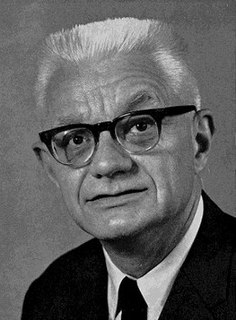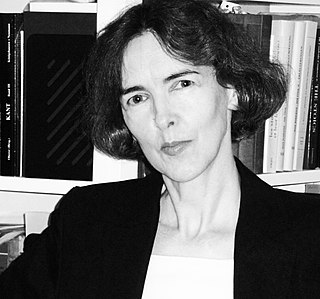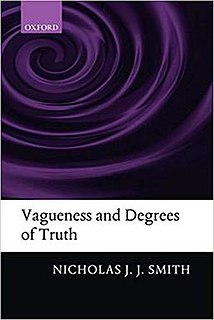Related Research Articles
In philosophy and logic, the classical liar paradox or liar's paradox or antinomy of the liar is the statement of a liar that they are lying: for instance, declaring that "I am lying". If the liar is indeed lying, then the liar is telling the truth, which means the liar just lied. In "this sentence is a lie" the paradox is strengthened in order to make it amenable to more rigorous logical analysis. It is still generally called the "liar paradox" although abstraction is made precisely from the liar making the statement. Trying to assign to this statement, the strengthened liar, a classical binary truth value leads to a contradiction.
In logic, the semantic principleof bivalence states that every declarative sentence expressing a proposition has exactly one truth value, either true or false. A logic satisfying this principle is called a two-valued logic or bivalent logic.

A paradox is a logically self-contradictory statement or a statement that runs contrary to one's expectation. It is a statement that, despite apparently valid reasoning from true premises, leads to a seemingly self-contradictory or a logically unacceptable conclusion. A paradox usually involves contradictory-yet-interrelated elements that exist simultaneously and persist over time. They result in "persistent contradiction between interdependent elements" leading to a lasting "unity of opposites".
In linguistics and philosophy, a vague predicate is one which gives rise to borderline cases. For example, the English adjective "tall" is vague since it is not clearly true or false for someone of middling height. By contrast, the word "prime" is not vague since every number is definitively either prime or not. Vagueness is commonly diagnosed by a predicate's ability to give rise to the Sorites paradox. Vagueness is separate from ambiguity, in which an expression has multiple denotations. For instance the word "bank" is ambiguous since it can refer either to a river bank or to a financial institution, but there are no borderline cases between both interpretations.

The sorites paradox is a paradox that results from vague predicates. A typical formulation involves a heap of sand, from which grains are removed individually. With the assumption that removing a single grain does not cause a heap to become a non-heap, the paradox is to consider what happens when the process is repeated enough times that only one grain remains: is it still a heap? If not, when did it change from a heap to a non-heap?
In classical logic, propositions are typically unambiguously considered as being true or false. For instance, the proposition one is both equal and not equal to itself is regarded as simply false, being contrary to the Law of Noncontradiction; while the proposition one is equal to one is regarded as simply true, by the Law of Identity. However, some mathematicians, computer scientists, and philosophers have been attracted to the idea that a proposition might be more or less true, rather than wholly true or wholly false. Consider My coffee is hot.

Early modern philosophy is a period in the history of philosophy at the beginning or overlapping with the period known as modern philosophy.

Carl Gustav "Peter" Hempel was a German writer, philosopher, logician, and epistemologist. He was a major figure in logical empiricism, a 20th-century movement in the philosophy of science. He is especially well known for his articulation of the deductive-nomological model of scientific explanation, which was considered the "standard model" of scientific explanation during the 1950s and 1960s. He is also known for the raven paradox.
Bastiaan Cornelis van Fraassen is a Dutch-American philosopher noted for his seminal contributions to philosophy of science and epistemology. He is a Distinguished Professor of Philosophy at San Francisco State University and the McCosh Professor of Philosophy Emeritus at Princeton University.

Timothy Williamson is a British philosopher whose main research interests are in philosophical logic, philosophy of language, epistemology and metaphysics. He is the Wykeham Professor of Logic at the University of Oxford, and fellow of New College, Oxford.

Trivialism is the logical theory that all statements are true and that all contradictions of the form "p and not p" are true. In accordance with this, a trivialist is a person who believes everything is true.

Susanne Bobzien is a German-born philosopher whose research interests focus on philosophy of logic and language, determinism and freedom, and ancient philosophy. She currently is senior research fellow at All Souls College, Oxford and professor of philosophy at the University of Oxford.

Logic is the study of correct reasoning or good arguments. It is often defined in a more narrow sense as the science of deductively valid inferences or of logical truths. In this sense, it is equivalent to formal logic and constitutes a formal science investigating how conclusions follow from premises in a topic-neutral way. When used as a countable noun, the term "a logic" refers to a logical formal system that articulates a proof system. Formal logic contrasts with informal logic, which is also part of logic when understood in the widest sense. There is no general agreement on how the two are to be distinguished. One prominent approach associates their difference with the study of arguments expressed in formal or informal languages. Another characterizes informal logic as the study of ampliative inferences, in contrast to the deductive inferences studied by formal logic.
Peter Richard Haddow Forrest is an Australian philosopher.
The no–no paradox is a distinctive paradox belonging to the family of the semantic paradoxes. It derives its name from the fact that it consists of two sentences each simply denying what the other says.
The following is a list of works by philosopher Graham Priest.
In logic, a finite-valued logic is a propositional calculus in which truth values are discrete. Traditionally, in Aristotle's logic, the bivalent logic, also known as binary logic was the norm, as the law of the excluded middle precluded more than two possible values for any proposition. Modern three-valued logic allows for an additional possible truth value.
In logic, an infinite-valued logic is a many-valued logic in which truth values comprise a continuous range. Traditionally, in Aristotle's logic, logic other than bivalent logic was abnormal, as the law of the excluded middle precluded more than two possible values for any proposition. Modern three-valued logic allows for an additional possible truth value and is an example of finite-valued logic in which truth values are discrete, rather than continuous. Infinite-valued logic comprises continuous fuzzy logic, though fuzzy logic in some of its forms can further encompass finite-valued logic. For example, finite-valued logic can be applied in Boolean-valued modeling, description logics, and defuzzification of fuzzy logic.

Vagueness and Degrees of Truth is a 2008 book by Nicholas J. Smith, in which the author examines vagueness based on the idea of "degrees of truth". It means that although some sentences are true and some are false, others possess intermediate truth values. In other words, some sentences are truer than the false sentences, but not as true as the true ones.

Logic: The Laws of Truth is a 2012 book by Nicholas J. Smith, in which the author provides an introduction to classical logic. It covers the formal tools and techniques of logic and their underlying rationales and broader philosophical significance. The book also presents various forms of proof: proof trees, major variants of natural deduction, axiomatic proofs, and sequent calculus. It also includes numerous logical exercises.
References
- ↑ Paoli, F. (27 March 2014). "Logic. The Laws of Truth". History and Philosophy of Logic . 35 (3): 306–308. doi:10.1080/01445340.2014.902243. ISSN 0144-5340. S2CID 119567628.
- ↑ Cook, Roy T. (25 November 2010). "Vagueness and Degrees of Truth - By Nicholas J. J. Smith". Theoria. 76 (4): 380–384. doi:10.1111/j.1755-2567.2010.01088.x. ISSN 0040-5825.
- ↑ Ripley, David (2010). "Review of Vagueness and Degrees of Truth". Analysis. 70 (1): 188–190. doi:10.1093/analys/anp152. JSTOR 23315099.
- ↑ "Logic taking the University by storm". Honi Soit. 9 September 2021. Retrieved 13 September 2022.